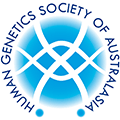Human Genetics Society of Australasia
Recommendations from the Human Genetics Society of Australasia on neurofibromatosis, heterogenous genetic disorders, methylenetetrahydrofolate reductase & apolipoprotein E testing, carrier state testing & other genetic tests. The Human Genetics Society of Australasia was formed in 1977 to provide a forum for the various disciplines collected under the title of Human Genetics. The HGSA is a full member of the International Federation of Human Genetics Societies and domestically we work closely with the Royal Australasian College of Physicians and Royal College of Pathologists of Australasia as well as other groups through the Pathology Associations Council.

4.
Don’t undertake carrier state testing for rare recessive disorders where a partner has a family history, the couple is non-consanguineous and there are no common causative mutations.
With a rare recessive disorder, although the individual with the family history will have an increased risk of being a carrier, their unrelated partner will have a low general population risk. Therefore, their a priori combined risk of having a child with this rare recessive condition will generally be less than 1%. If the gene has no known common disease causative mutations then testing the unrelated partner for carrier status has low sensitivity and specificity.
Supporting evidence
Meikle PJ, Hopwood JJ, Clague AE, Carey WF. Prevalence of lysosomal storage disorders. JAMA 1999;281(3):249-54.
A preliminary list was developed by the Lead Fellow which was then distributed to all the clinical geneticists in Australia who are all members of the Australasian Association of Clinical Geneticists (AACG), a special interest group of the HGSA. Following feedback the topic was revisited at a meeting of this group during the annual scientific conference of the HGSA, after which the list was finalised.
Related recommendations
- 1 Don’t use brain magnetic resonance imagery (MRI) for routine surveillance of asymptomatic neurofibromatosis type 1
- 2 Don’t undertake sequential testing for heterogeneous genetic disorders when targeted next generation sequencing (NGS) is available
- 3 Don’t undertake genetic testing for methylenetetrahydrofolate reductase (MTHFR), apolipoprotein E (APOE) and other such tests where the clinical utility for diagnostic purposes is extremely low
- 4 Don’t undertake carrier state testing for rare recessive disorders where a partner has a family history, the couple is non-consanguineous and there are no common causative mutations.
- 5 Don’t undertake genetic testing when clinical diagnostic criteria exist and there are no reproductive or predictive testing implications.